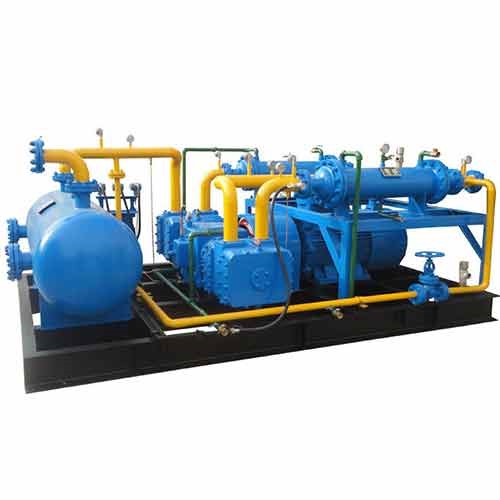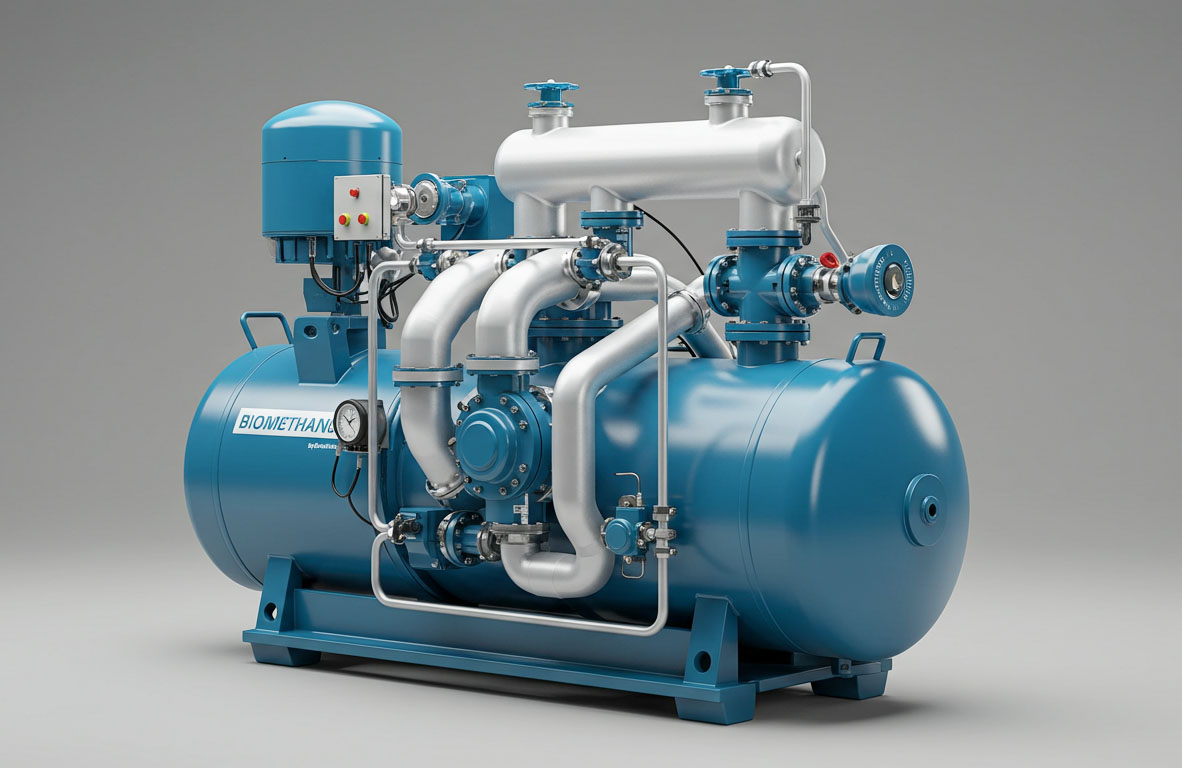Industrial Hydrogen Compressor: A Comprehensive Guide to Its Features and Applications
Industrial hydrogen compressor is machine that are used to compress hydrogen gas to high pressures, making it easier to store, transport, and use in various industrial applications. Hydrogen, being the simplest and lightest element, requires special compressors that can handle its unique properties. These compressors are essential for the safe and efficient use of hydrogen in a wide range of industrial processes.

The fundamentals of hydrogen compression involve increasing the pressure of hydrogen gas to levels that are suitable for various industrial applications. Hydrogen compressors are designed to handle the low molecular weight of hydrogen, which makes it difficult to compress using conventional compressors. Industrial hydrogen compressors come in different types and designs, each with varying performance metrics, safety features, and regulatory requirements.
Key Takeaways
- Industrial hydrogen compressors are essential for the safe and efficient use of hydrogen in various industrial applications.
- Hydrogen compressors are designed to handle the low molecular weight of hydrogen, which makes it difficult to compress using conventional compressors.
- Different types of hydrogen compressors are available, each with varying performance metrics, safety features, and regulatory requirements.
Fundamentals of Hydrogen Compression
Principles of Hydrogen Compression
Hydrogen compression is the process of reducing the volume of hydrogen gas to increase its pressure, making it easier to transport and store. The compression process is based on Boyle’s law, which states that the pressure of a gas is inversely proportional to its volume at constant temperature. Therefore, to increase the pressure of hydrogen gas, its volume must be reduced.
The compression process also follows Charles’s law, which states that the volume of a gas is directly proportional to its absolute temperature at constant pressure. Therefore, to maintain a constant pressure while compressing hydrogen, the temperature of the gas must be controlled.
Types of Hydrogen Compressors
There are two main types of compressors used for hydrogen compression: positive displacement compressors and dynamic compressors.
Positive displacement compressors work by trapping a fixed volume of gas and then reducing the volume by mechanical means, such as a piston or screw. These compressors are further divided into reciprocating and rotary compressors. Reciprocating compressors use a piston to compress the gas, while rotary compressors use a screw or vane to compress the gas.
Dynamic compressors, also known as centrifugal compressors, work by imparting kinetic energy to the gas and then converting the kinetic energy into pressure. These compressors use a high-speed impeller to accelerate the gas, which is then directed into a diffuser where the kinetic energy is converted into pressure.
The choice of compressor depends on the application and the required pressure ratio. Positive displacement compressors are better suited for low-pressure applications, while dynamic industrial compressors are better suited for high-pressure applications.
Overall, the principles of hydrogen compression and the types of compressors used are important factors to consider when designing an industrial hydrogen compression system.
Industrial Applications
Hydrogen compressors have a wide range of industrial applications in various sectors. Here are some of the most common applications:
Energy Sector
Hydrogen compressors are essential for the energy sector, where they are used to compress hydrogen gas for transportation and storage. Hydrogen is a clean and efficient fuel source that can be used to power fuel cells and combustion engines. Hydrogen compressors play a critical role in the production and distribution of hydrogen for energy applications.
Manufacturing Processes
Hydrogen compressors are used in various manufacturing processes, such as the production of semiconductors, glass, and metals. In the semiconductor industry, hydrogen is used as a carrier gas for the deposition of thin films. Hydrogen compressors are used to supply high-purity hydrogen gas to the deposition chamber.
Transportation and Storage
Hydrogen compressors are used in the transportation and storage of hydrogen gas. Hydrogen gas is compressed to increase its density, making it easier to transport and store. Hydrogen compressors are used to compress hydrogen gas to high pressures, typically between 350 and 700 bar. Compressed hydrogen gas can be stored in tanks or transported via pipelines.
Overall, hydrogen compressors play a critical role in various industrial applications, from energy production to manufacturing processes and transportation and storage. The reliable and efficient operation of hydrogen compressors is essential for the success of these industries.
Design and Materials
Compressor Design Considerations
When designing an industrial hydrogen compressor, several considerations must be taken into account to ensure optimal performance. The compressor must be able to handle the high pressure and high flow rate of hydrogen gas, while also maintaining efficiency and reliability.
One important design consideration is the type of compressor to use. According to a review article, there are several types of hydrogen compressors, including reciprocating piston compressors, hydrogen diaphragm compressors, and ionic liquid compressors. Each type has its own advantages and disadvantages, and the choice of compressor will depend on the specific application and requirements.
Another important design consideration is the operating temperature and pressure. The compressor must be able to operate within a certain range of temperature and pressure to ensure optimal performance and safety. According to a design study, metal hydride based thermally driven hydrogen compressors (MHHC) are a promising technology for the compression of hydrogen. Selection of metal hydride alloys and reactor design have a great impact on the performance of the thermally driven MHHC.
Material Selection for Durability
The materials used in the construction of an industrial hydrogen compressor must be carefully selected for durability and safety. Hydrogen gas is highly reactive and can cause embrittlement and cracking in certain materials.
According to Siemens Energy, the materials used in their hydrogen compressors are selected based on their compatibility with hydrogen gas and their ability to withstand high pressure and temperature. Materials such as stainless steel, aluminum, and titanium are commonly used in the construction of hydrogen compressors.
In addition to material selection, proper maintenance and inspection are critical to ensure the longevity and safety of the compressor. Regular inspection and testing can help identify any potential issues before they become major problems.
Performance Metrics

Efficiency and Throughput
When it comes to industrial hydrogen compressors, efficiency and throughput are two essential performance metrics. Efficiency is the ratio of the amount of hydrogen compressed to the amount of energy used to compress it. High efficiency compressors are desirable as they help to minimize the energy required to produce hydrogen. Throughput, on the other hand, refers to the amount of hydrogen that can be compressed per unit of time. High throughput compressors are necessary to meet the high demand for hydrogen in industrial applications.
To achieve high efficiency and throughput, hydrogen compressors must be designed to operate at optimal conditions. This means that the compressor must be sized appropriately to meet the required flow rate and pressure, and the compressor components must be designed to minimize friction and energy losses. Additionally, the compressor must be operated within the manufacturer’s recommended operating range to ensure maximum efficiency and throughput.
Reliability and Maintenance Requirements
Another important performance metric of industrial hydrogen compressors is reliability. Reliability refers to the ability of the compressor to operate continuously without failure or breakdown. In industrial applications, downtime due to compressor failure can result in significant losses in production and revenue. Therefore, it is essential to choose a compressor that has a high level of reliability.
To ensure high reliability, hydrogen compressors must be designed with robust components that can withstand the harsh operating conditions of industrial applications. Additionally, regular maintenance and inspection are necessary to identify and address any potential issues before they cause a failure. Maintenance requirements may vary depending on the type of compressor and its operating conditions, but typically include tasks such as lubrication, filter replacement, and component inspection.
In summary, when selecting an industrial hydrogen compressor, it is essential to consider performance metrics such as efficiency, throughput, and reliability. By choosing a compressor that is designed for optimal performance and is maintained regularly, industrial users can ensure that their hydrogen production operations run smoothly and efficiently.
Safety and Regulatory Standards

Operational Safety Guidelines
When working with industrial hydrogen compressors, operational safety guidelines must be followed to prevent accidents and ensure the safety of personnel. These guidelines include proper handling, storage, and transportation of hydrogen gas, regular equipment maintenance, and the use of personal protective equipment (PPE) such as gloves, goggles, and respirators. It is also important to follow guidelines for the use of electrical equipment in areas where hydrogen gas is present to prevent ignition sources.
Compliance with Industry Regulations
In addition to following operational safety guidelines, compliance with industry regulations is necessary to ensure the safe use of industrial hydrogen compressors. Regulations and standards that apply to hydrogen gas include those set by the Occupational Safety and Health Administration (OSHA) and the National Fire Protection Association (NFPA). OSHA’s regulations for hydrogen gas are outlined in 29 CFR 1910.103 and include requirements for the design, installation, and operation of hydrogen gas systems. The NFPA’s standards for hydrogen gas include NFPA 2: Hydrogen Technologies Code and NFPA 55: Compressed Gases and Cryogenic Fluids Code.
Compliance with these regulations and standards is important for maintaining a safe working environment and avoiding legal and financial penalties. It is the responsibility of the employer to ensure that employees are trained on and follow these regulations and standards.
Technological Advancements

Innovations in Compression Technology
Hydrogen compressors have undergone significant technological advancements in recent years, resulting in more efficient and reliable compression systems. One of the most notable innovations is the development of electrochemical compression technology, which uses electrochemical reactions to compress hydrogen gas. This technology offers several advantages over traditional mechanical compressors, including higher energy efficiency, lower noise levels, and reduced maintenance requirements.
Another significant innovation in compression technology is the use of ionic liquids as a compression medium. Ionic liquids are a type of salt that remains in a liquid state at room temperature and can be used to compress hydrogen gas. This technology has the potential to offer higher compression ratios than traditional mechanical compressors, resulting in more efficient and cost-effective compression systems.
Future Trends in Hydrogen Compressors
The future of hydrogen compressors is likely to be focused on further improving energy efficiency and reducing maintenance requirements. One potential area of development is the use of advanced materials, such as carbon nanotubes and graphene, to create more efficient and durable compression systems.
Another area of focus is the development of smart compression systems that can optimize compression based on real-time data and system performance. These systems could use advanced sensors and machine learning algorithms to optimize compression settings and reduce energy consumption.
Overall, the future of hydrogen compressors looks promising, with continued advancements in technology expected to drive increased efficiency and reliability in compression systems.
Environmental Impact

Emissions and Sustainability
Industrial hydrogen compressors play a crucial role in the production and storage of hydrogen gas, which has been identified as a promising alternative to fossil fuels in the transition to a low-carbon economy. However, the production and use of hydrogen gas can have environmental impacts, particularly in terms of greenhouse gas emissions. It is essential that the production and use of hydrogen gas are sustainable and do not contribute to climate change.
According to a study published in ScienceDirect, renewable hydrogen supply chains are associated with environmental impacts, and critical parameters focus on hotspots along the hydrogen supply chain. The study suggests that regions with high renewable energy potential are ideal for hydrogen production, and the benefits increase as the difference in renewable energy potential increases.
To ensure that hydrogen production and use is sustainable, it is important to minimize emissions throughout the entire supply chain. This includes reducing emissions from the production of hydrogen, as well as from the compression and transportation of the gas.
Role in Clean Energy Initiatives
Hydrogen gas is a clean and renewable source of energy that has the potential to play a significant role in the transition to a low-carbon economy. Industrial hydrogen compressors are essential in the production and storage of hydrogen gas, which can be used to fuel vehicles, power homes and businesses, and even generate electricity.
The use of hydrogen gas can help reduce greenhouse gas emissions and improve air quality, particularly in urban areas. According to a study published in Springer, hydrogen development should also meet the seventh goal of ‘affordable and clean energy’ of the United Nations Sustainable Development Goals.
In conclusion, industrial hydrogen compressors are essential in the production and storage of hydrogen gas, which has the potential to play a significant role in the transition to a low-carbon economy. It is important to ensure that hydrogen production and use is sustainable and does not contribute to climate change.
Frequently Asked Questions
What are the different types of hydrogen compressors available on the market?
There are two main types of hydrogen compressors available on the market: positive displacement compressors and dynamic compressors. Positive displacement compressors include reciprocating compressors and rotary screw compressors, while dynamic compressors include centrifugal compressors.
How do you determine the appropriate compressor size for hydrogen applications?
The appropriate compressor size for hydrogen applications depends on the required flow rate and discharge pressure. The flow rate is typically measured in cubic meters per hour (m³/h) or cubic feet per minute (CFM), while the discharge pressure is measured in bar or psi. It is important to choose a compressor that can handle the required flow rate and discharge pressure while also taking into account factors such as ambient temperature and altitude.
What is the typical price range for industrial hydrogen compressors?
The price of industrial hydrogen compressors varies depending on the type, size, and manufacturer. Generally, positive displacement compressors are less expensive than dynamic compressors. The price range for industrial hydrogen compressors can range from a few thousand dollars to hundreds of thousands of dollars.
Who are the leading manufacturers of hydrogen compressors?
There are several leading manufacturers of hydrogen compressors, including Atlas Copco, Siemens Energy, and Mitsubishi Heavy Industries. These companies offer a range of compressors designed for different hydrogen applications.
What are the common failure rates and reliability concerns with hydrogen compressors?
Common failure rates and reliability concerns with hydrogen compressors include leaks, corrosion, and mechanical failure. It is important to properly maintain and inspect hydrogen compressors to prevent these issues from occurring.
Can hydrogen compressors operate at pressures as high as 700 bar, and what are the technical challenges?
Yes, hydrogen compressors can operate at pressures as high as 700 bar. However, compressing hydrogen to such high pressures requires specialized equipment and poses technical challenges such as high temperatures and potential hydrogen embrittlement of materials. It is important to choose a compressor that is designed to handle high-pressure hydrogen applications and to properly maintain and inspect the compressor to prevent issues from occurring.


